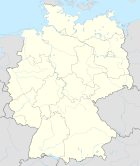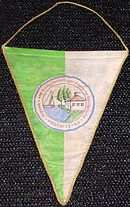Gustow
| coat of arms | Germany map | |
|---|---|---|

|
Coordinates: 54 ° 18 ' N , 13 ° 13' E |
|
| Basic data | ||
| State : | Mecklenburg-Western Pomerania | |
| County : | Western Pomerania-Ruegen | |
| Office : | Mountains on Rügen | |
| Height : | 15 m above sea level NHN | |
| Area : | 28.39 km 2 | |
| Residents: | 585 (Dec. 31, 2019) | |
| Population density : | 21 inhabitants per km 2 | |
| Postal code : | 18574 | |
| Area code : | 038307 | |
| License plate : | VR, GMN, NVP, RDG, RÜG | |
| Community key : | 13 0 73 038 | |
| Office administration address: | Markt 5–6 18528 Bergen on Rügen |
|
| Website : | ||
| Mayor : | Peter Geissler | |
| Location of the community Gustow in the district of Vorpommern-Rügen | ||
Gustow is a German municipality in the district of Vorpommern-Rügen on the island of Rügen in Mecklenburg-Western Pomerania. The municipality is administered by the Bergen auf Rügen office based in the city of the same name .
geography
The municipality of Gustow is located in the southwest of Rügen on the Strelasund - the strait that separates Rügen from the mainland. The Rügen dam is about six kilometers from the village. Gustow includes the island of Gustower Werder and the Drigge peninsula, which extends far into the Strelasund .
The districts Benz , Drigge , Gustow, Nesebanz , Prosnitz , Sissow and Warksow belong to the community .
history
Gustow : The name comes from the Slavic Gostov and means place of Gost . The farm and village were owned by those from the east on Plüggentin until the 18th century. In 1324 Wizlaw III sold. a pension to a widow of Barnekow , which fell to the Bergen monastery on Rügen in 1330 .
With the Peace of Westphalia of 1648, Rügen and thus the place Gustow came under Swedish rule, after the place had previously belonged to the Duchy of Pomerania . Due to the battle of Warksow , which was victorious for Sweden , Rügen temporarily fell back to Sweden in early 1678 after Rügen had been occupied by a Danish invasion in 1677.
In 1815 the municipality and Western Pomerania became part of the Prussian province of Pomerania .
In 1867 the place consisted of 12 inhabited houses with a total of 152 inhabitants.
Since 1818 Gustow belonged to the district of Rügen . It was only part of the Putbus district from 1952 to 1955 . The community then belonged to the Rügen district in the Rostock district until 1990 and became part of the state of Mecklenburg-Western Pomerania in the same year. The district of Rügen, which has been called this again since 1990, was merged in 2011 in the district of Vorpommern-Rügen.
Prosnitz: The manor house was built at the beginning of the 19th century and then rebuilt; Hotel since 1994. During the GDR era, the Deutsche Reichsbahn built and operated a youth and children's holiday camp for its employees.
Coat of arms, flag, official seal
The municipality has no officially approved national emblem, neither a coat of arms nor a flag . The official seal is the small state seal with the coat of arms of the region of Western Pomerania . It shows an upright griffin with a raised tail and the inscription "GEMEINDE GUSTOW".
Worth seeing
- Prosnitzer Schanze from the time of the Thirty Years' War is located near Gustow . In 1808 the French expanded the hill into a fort.
- Gustow village church , completely destroyed in 1677 and reconstructed from 1708 to 1734.
- Mordwangen (atonement stones), specialty on Rügen: A Mordwange from 1510 is located northeast of the Gustow church. This stone cheek was donated in memory of the then preacher Thomas Norenberg, who, according to legend, was killed by drunken farmers.
- A crucifix with two angels is outlined on the front , on the left a kneeling man with a sword on his head, on the right a goblet and a coat of arms with a kind of house brand. The atonement stone is made of granite , protrudes 2.50 meters from the ground and is 60 cm wide.
- The minus inscription reads:
- na · der · bort · xpi · m · ccccc · unde · x · des · doredag · in · d · quatteper · vor · sute · michaele · ys · geslage · h · thomas · norenberch · karkh · to · gustow · weset · dem · got · gnedich · sy
- Translation: After the birth of Christ in 1510 on Fool's Day in Quatember in front of St. Michael , Mr. Thomas Norenberg, church lord of Gustow, was beaten, to whom God be gracious
Sons and daughters
- Gustav Bödcher (1836–1899), German administrative lawyer, Mayor of Halberstadt and member of the Prussian mansion
- Otto Last (1906–1990), German politician (SED), Deputy Minister for State Security
Web links
Individual evidence
- ↑ Statistisches Amt MV - population status of the districts, offices and municipalities 2019 (XLS file) (official population figures in the update of the 2011 census) ( help ).
- ↑ Main Statute § 1 (PDF).








